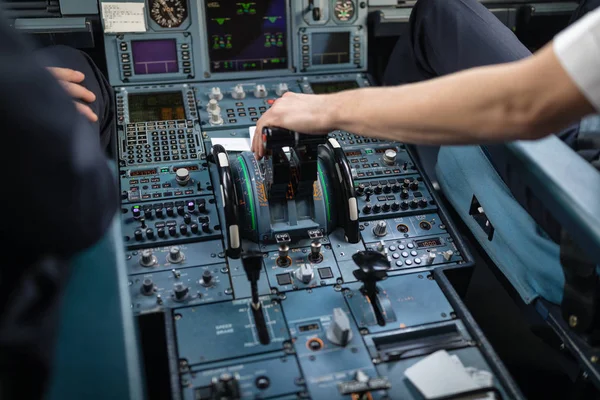Thales Group and Its Strategic Role in the Aircraft Flight Control System Market

Introduction
The Aircraft Flight Control System (FCS) Market is a rapidly growing sector in the aerospace industry, driven by advancements in automation, artificial intelligence (AI), and improved safety features. As one of the leaders in aerospace technology, Thales Group has consistently been at the forefront of these innovations, playing a key role in shaping the future of aviation. This article explores the strategies, emerging innovations, and developments adopted by Thales Group in the Aircraft Flight Control System market.
Thales Group: An Overview
Thales Group, a global technology leader, specializes in aerospace, defense, and security markets. With its strong presence in over 50 countries, Thales focuses on providing advanced solutions that improve operational efficiency, safety, and security. In the aircraft flight control system domain, the company is a significant player, delivering cutting-edge systems that integrate seamlessly with modern aircraft.
Strategic Focus of Thales Group
Thales Group’s strategy for growth in the Aircraft Flight Control System market revolves around several key factors, including technological advancements, collaboration with major aircraft manufacturers, and an emphasis on sustainability.
1. Technological Advancements
Thales has prioritized research and development (R&D) in areas such as fly-by-wire systems, autonomous flight, and next-generation flight control technologies. The company’s dedication to innovation has led to the creation of flight control systems that are not only more reliable but also more efficient. Thales continues to invest heavily in AI and machine learning, which are expected to play a significant role in improving aircraft control systems.
2. Partnerships and Collaborations
Thales Group also focuses on forging strong partnerships with leading aerospace manufacturers such as Airbus, Boeing, and other key stakeholders. These collaborations help Thales ensure that its flight control systems meet the ever-evolving needs of the aerospace industry, particularly in the areas of safety, performance, and environmental impact.
3. Sustainability and Environmental Goals
With increasing pressure on the aviation sector to reduce its environmental footprint, Thales Group has integrated sustainability into its strategy. The development of lighter and more energy-efficient flight control systems helps reduce overall fuel consumption and emissions, aligning with global goals for cleaner aviation technologies.
Emerging Innovations in Aircraft Flight Control Systems
Thales Group has been instrumental in several emerging innovations within the Aircraft Flight Control System market, which continue to redefine the possibilities for next-generation aircraft.
1. Fly-by-Wire Systems
Fly-by-wire technology, where flight control inputs are transmitted electronically rather than via mechanical linkages, has become a standard in modern aircraft. Thales has been a leader in the development of these systems, which offer numerous advantages such as reduced weight, enhanced safety features, and more precise control. Their systems also provide greater flexibility in aircraft design, enabling manufacturers to develop more aerodynamic and fuel-efficient models.
2. Autonomous Flight Systems
Autonomous flight, including the automation of key flight tasks, is an area where Thales is making significant progress. The company is exploring technologies that allow aircraft to fly autonomously under certain conditions, with minimal or no pilot intervention. This could lead to safer, more efficient, and cost-effective flight operations, especially in the context of unmanned aerial vehicles (UAVs) and urban air mobility (UAM).
3. Artificial Intelligence and Machine Learning
Thales has embraced artificial intelligence (AI) and machine learning to enhance the functionality of its flight control systems. These technologies can analyze large amounts of data in real time to optimize flight performance, predict system failures, and improve decision-making processes during flight. The integration of AI is also seen as a key component in the development of autonomous flight systems.
4. Advanced Flight Control Systems for Electric and Hybrid Aircraft
With the rising interest in electric and hybrid aircraft, Thales is also investing in the development of flight control systems tailored to these new platforms. The challenge with electric propulsion systems lies in their unique dynamics, and Thales’ innovations are addressing these challenges to ensure that flight control systems can perform efficiently in a zero-emissions environment.
Developments in the Aircraft Flight Control System Market
Thales Group’s developments within the Aircraft Flight Control System market are diverse and address both commercial and military aviation needs.
1. Integrated Systems for Commercial Aircraft
Thales has developed integrated flight control systems that allow for greater connectivity between various aircraft subsystems. These systems not only enhance the safety and efficiency of flights but also improve the passenger experience by reducing turbulence and optimizing flight paths.
2. Military Aircraft Solutions
In the defense sector, Thales provides advanced flight control solutions for military aircraft. These systems are designed to meet the demanding operational requirements of military missions, offering precise control, enhanced stability, and reliability under challenging conditions.
3. Next-Generation Cockpit Technologies
Thales is also leading the charge in next-generation cockpit technologies. By integrating advanced flight control systems with cockpit automation, the company helps reduce pilot workload, enhance situational awareness, and improve overall flight safety.
4. Cybersecurity for Flight Control Systems
As cyber threats become more sophisticated, Thales has been enhancing the cybersecurity of its flight control systems. Ensuring that these systems are resilient to potential cyberattacks is a critical aspect of maintaining the safety and reliability of modern aircraft.
Conclusion
Thales Group is a key player in the Aircraft Flight Control System market, with a clear focus on innovation, technological advancements, and sustainability. Through strategic partnerships, significant R&D investment, and a commitment to addressing emerging trends such as autonomous flight and electric propulsion, Thales is well-positioned to lead the way in the future of aviation. As the aerospace industry continues to evolve, the company’s contributions to flight control systems will likely remain central to the development of safer, more efficient, and environmentally friendly aircraft.
- Art
- Causes
- Crafts
- Dance
- Drinks
- Film
- Fitness
- Food
- الألعاب
- Gardening
- Health
- الرئيسية
- Literature
- Music
- Networking
- أخرى
- Party
- Religion
- Shopping
- Sports
- Theater
- Wellness
- IT, Cloud, Software and Technology


